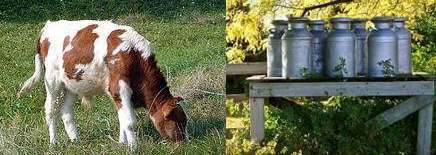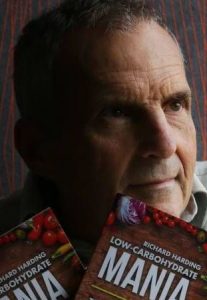About Richard Harding
Diet is a critical part of health care that is neglected. Doctors are not fully trained in nutrition. When was the last time you went to your doctor and was asked about your diet or lifestyle? Some of the largest corporations in the world are food, pharmaceutical and health care companies so access to correct information is difficult.
Our health must be one of our most valuable assets. Prevention should be the primary focus of medicine with treatment a secondary consideration.
Much publicity is given to the longevity of the people of Japan and Okinawa (an archipelago that stretches from southern Japan to Taiwan). However, the population with the longest lifespan and the highest levels of health on the planet is the vegan Californian Seventh-day Adventists.
We all need to eat and we wish to be healthy. So the food and health industries are very powerful and influential. People are very passionate about what they believe to be healthy food choices. It can be very difficult to get high quality health and dietary information.
The good news is that many of the “diseases of affluence”, such as heart disease, sex hormonal-related cancers (breast, ovarian, endometrial and prostate cancers), type 2 diabetes and high blood pressure can be prevented and possibly reversed simply by changing what we choose to eat.
I have been a lecturer in nutrition in Newcastle, Australia at WEA Hunter and has been involved in the design of nutrition courses for degree and diploma qualifications in Health Sciences.
My qualifications include:
- Certificate in Plant-based Nutrition – e Cornell University
- Certificate IV in Food Coaching
- BSc – Chemistry, Mathematics (Pure & Applied), Information Technology (University of Sydney)
- Certificate IV in Training and Assessment
I have worked in the pathology and information technology industries before turning to preventative medicine – prevention should be the prime focus of our health care.
I worked in the IT industry since the 1970s as a computer programmer, system designer and project manager for companies such as CBC Bank, National Australia Bank, Burroughs Australia and Unisys working on projects for ANZ Bank, State Bank of NSW, Health Insurance Commission (Medicare), NRMA, Reserve Bank of Australia, City Bank, North Power, Chase Manhattan Bank and ACIRL (Australian Coal Industry Research Laboratories).
I have worked as the system manager for a large pathology business that had a network of 10 pathology laboratories online 24 hours a day for 6 days a week.
My website consists of over 140 webpages and with more than 110,000 words. Most are related to health and nutrition with others relating to the environment, agriculture, philosophy and psychology. Many issues that the ancient Greeks wrestled with are still relevant today.
In The Republic, Book 2, Plato describes a “rustic picture” of a way of life. The inhabitants “spend their days in houses which they have built for themselves; they make their own clothes and produce their own corn and wine. Their principal food is barley-meal and flour of wheat, and they drink in moderation. They live on the best of terms with each other, and take care not to have too many children. […] They will have salt and olives and cheese, vegetables and fruits, and chestnuts to roast at the fire.”
Plato continues that those “who want the comforts of life“, will create a state where “living in this way we shall have much greater need of physicians than before. […] Then a slice of our neighbours’ land will be wanted by us for pasture and tillage, and they will want a slice of ours.”
Some 500 years later, in Plutarch’s Morals. Vol. V, Plutarch writes at great length against the mistreatment, exploitation and killing of animals – “but for the sake of some little mouthful of flesh, we deprive a soul of the sun and light, and of that proportion of life and time it had been born into the world to enjoy.”
A 90 page book WHO’s Guidelines for Saturated Fats: Time for an examination of our values is avaible that examines the role of corporate funding, medical researhers, the media and government regulators collude to ensure that corporate profits are protected at the expense of our health.
A 97 minute movie is also available that shows some of the highlights of the book. Extensive references from peer-reviewed medical journals are included.
My father worked for a bank when I was a child. I was born in Grafron in northern NSW before moving to Milton and Ulladulla on the NSW south coast and to Griffith in the west of the state. My parents then bought a newsagency.

At Milton we lived next door to a wonderful dairy farmer, Eddie and his wife Mrs Ingold. They had Ayrshire cows with several Jersey cows to increase cream production. The farm was located on steep countryside strewn with granite boulders. Nearby, Eddie had another farm where he grew corn. 1
Each cow had a name. They knew the order that they were milked and had a preference for the same bail each day. When a new cow joins a herd there is some jostling as the cows find their place. Once this occurs, there is no further need to assert dominance.
The cows had a good life, except when a new calf is born. The females are taken from the mother so she can supply milk. The males, shortly after birth, were tied to a electricity pole next to the milk cans, to be taken away.
Every year in January a school friend, John and I did a canyon trip in the Blue Mountains of NSW. At the same time, I visit my local doctor.
In 2014, just after my 60th birthday, the results came back with abnormal red and white blood cell counts and an elevated bilirubin. Elevated bilirubin is a sign that the liver is not functioning as well as it should.
It took 8 months to diagnose what the problem was. I have myeloma which is a cancer of the bone marrow that can no longer properly produce red and white blood cells. As a result, the immune system is compromised.
In September 2014, I ended up in hospital for 9 weeks, including 7 weeks in intensive care. I was 68 kg (150 pounds) before admission – the same weight when I was at high school. I lost 21 kg (46 pound) in 4 weeks and lost 20 cm (8 in) in height. Myeloma also damages bones resulting in abnormal bone growth, bone deformity, crushed vertebrae and many broken ribs. I am still 15 kg lighter and 20 cm shorter than my pre-sickness days.
Even as a teenager, I was conscious of what I ate and have not eaten animal products for decades. I kept a skipping rope outside the back door and would do 1,000 skips a couple times a day when it was time to have a break. Now, I cannot do one.
Multiple myeloma is one of our most dreaded cancers. It’s a cancer of our antibody-producing plasma cells found in our bone marrow, and is considered one of our most intractable blood diseases. The precursor disease is called monoclonal gammopathy of undetermined significance (MGUS). Multiple myeloma is almost always preceded by MGUS. It has a prevalence of about 3% in the older white population.
MGUS does not have any symptoms. If it does progress to multiple myeloma, you only have about four years to live. That is the average life expectancy. One person (such as me) living a lot longer than expected raises the average life expectancy. The actual life expectancy is much less.
I was on a whole-food, plant-based diet for years and which was not sufficient to prevent me from progressing to multiple myeloma. There is evidence that myeloma is associated with agricultural and environmental toxins. One study shows that agricultural workers have a 4.5 times greater prevalence than other occupations. Yes, I do live in what appears to be a idyllic rural setting but two toxic aluminum smelters were located close by. The port of Newcastle is the world’s largest coal export terminal. Coal dust is a major source of pollution and I am located close to rail transport that transports coal in trains containing 80-90 uncovered wagons many times a day.
We need to find ways of treating MGUS early before it turns into cancer but such treatment does not exists. A whole-food, plant-based diet certainly helps but is no guarantee. The consumption of curcumin, the active ingredient in the spice turmeric has been associated with a decrease in the markers for multiple myeloma.
On the 20th July 2022, I was told that I was in immediate danger of “catastrophic bone marrow dysfuction”. Fortunately, that was resolved within the next 7 days, but it gives an indication of the precariousness of my situation.
I live with my wife Ruth in the Hunter Valley of NSW. We have a big vegetable garden, keep geese and chickens and have planted hundreds of trees in what was an empty paddock. Other interests include Rural Fire Service, music (play piano), photography as well as ancient Greek, medieval and Asian philosophies.
I wish to dispel many of the myths of “Pop Psychology” that has its origins in an alien world before the Renaissance and the “Age of Enlightenment“. This was a world full of malevolent spirits, virulent illnesses such as bubonic plague that resulted from divine displeasure and where the masses were at the mercy of a bitter European climate and warring rulers. Religious fervent resulted in bloody religious wars and the church exploited the fears of population to control their subjects. A world where, if you swore at a neighbour and something bad happened to them, you could be in big, big trouble.
Search the website for “Descartes” to find out his true beliefs and how he transformed Western philosophy which contrasts substantially from the commentaries of many popular commentators.
Similarly, the majority of popular nutrition advice advocates very-low carbohydrate diets to prevent our modern day health crises of obesity, diabetes, high blood pressure and auto-immune diseases.
Last updated on Thursday 15 August 2024 at 22:07 by administrators











It is great to hear from you.
My fundamental guiding principle regarding nutrition is a “whole-food, plant-based” diet which means no added oils and food as close as possible to a natural state which discounts all oils, including coconut oil.
I have written an article regarding coconut oil,
What are the health benefits of coconut oil?
Yes, coconut ice cream, coconut yogurt and coconut oil are all very tasty but it is very high in fat, saturated fats and calories. Whilst it may have a high smoking point, I think we are better served if we avoid frying foods or using any kind of added oils.
Richard
My name is Jennifer Foust and I am with All Natural Healers. We recently published a pretty in-depth post on the benefits of Coconut Oil that I think you might enjoy.
It discusses health and beauty benefits as well as cooking with coconut oil.
I was doing some research and came across your site:
wisenutritioncoaching.com.au Thank you for sharing such helpful and useful information!
The link to our guide is below:
https://www.naturalhealers.com/holistic-health/coconut-oil-ultimate-guide/
If you have a quick minute to take a look, I think it would make a great new resource to share with your readers : )
I hope to hear from you soon,
Jennifer Foust | All Natural Healers
p: 206.436.7500 | Seattle, WA